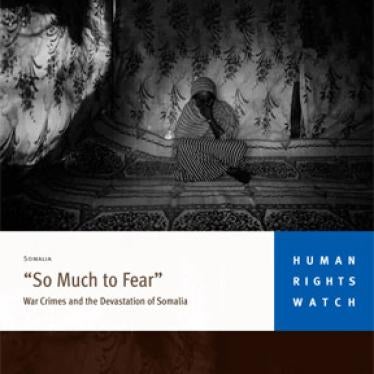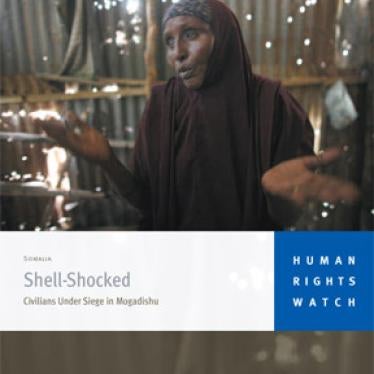(New York) - A new incident involving African Union troops in Mogadishu that left at least 13 people dead underscores the urgent need for an independent inquiry into laws-of-war violations by all forces in Somalia, Human Rights Watch said today. Human Rights Watch also called on the top UN official in Somalia to immediately retract a statement comparing Somali journalists reporting the incident to those who incited the Rwandan genocide.
On February 2, 2009, a roadside bomb struck a vehicle containing Ugandan soldiers from the African Union Mission in Somalia (AMISOM), wounding at least one, according to AMISOM officials. Local media and other accounts reported that the African Union troops reacted by firing indiscriminately on civilians in the area. Reliable sources reported to Human Rights Watch that at least 13 Somalis were killed and at least 15 more were wounded by the bomb blast and ensuing gunfire. Most of the dead, many or all of whom were civilians, were killed by gunfire.
AMISOM officials and the UN special representative of the secretary-general for Somalia, Ahmedou Ould-Abdallah, denied that the African Union troops killed any civilians, but no independent investigation has taken place.
"AMISOM troops have the right to defend themselves from attack, but they must do so according to the laws of war," said Georgette Gagnon, Africa director at Human Rights Watch. "The uncertainty around the shooting of these civilians underlines the urgent need for independent investigations of alleged crimes by all forces in Somalia."
Human Rights Watch has repeatedly called for an independent Commission of Inquiry to be established by the UN Security Council to investigate and map out the most serious abuses by all forces taking part in the conflict in Somalia.
This is not the first time AMISOM troops have been implicated in indiscriminate attacks on Somali civilians. In September 2008, witnesses, journalists, and rights activists told Human Rights Watch that African Union forces responded to attacks on their positions by indiscriminately shelling Mogadishu's Bakara Market area. The market has long been a stronghold of insurgents opposed to the Somali Transitional Federal Government (TFG). Insurgent groups based in Bakara Market have regularly used civilians as shields as they launched indiscriminate mortar attacks on other parts of the city.
The small and beleaguered African Union force has been in Mogadishu since 2007, with a limited mandate to secure key infrastructure and to provide protection to officials of Somalia's weak transitional government. It has never approached its intended strength of 8,000 troops, and now numbers fewer than 3,000 Ugandan and Burundian soldiers. Ethiopian troops backing the transitional government withdrew from Mogadishu in January 2009, leaving AMISOM as the only significant force in the capital besides insurgent groups.
The top UN official in Somalia, Ahmedou Ould-Abdallah, reacted angrily to allegations that the AU troops had fired on civilians during the February 2 incident. In a February 3 interview with the Voice of America radio service, Ould-Abdallah said: "What happened is to divert attention from what is going on here, and as usual to use the media to repeat Radio Mille Colline, to repeat the genocide in Rwanda." The remark essentially compared Somali journalists who reported on the incident to the infamous Radio Mille Collines, which was used to incite participation in the Rwandan genocide in 1994. He also suggested a one-month moratorium on any kind of reporting on the conflict in Somalia.
Human Rights Watch said Ould-Abdallah's statement was especially disturbing because many Somali journalists have risked their lives and livelihoods to report on the crisis in their country. The day after the UN official's remarks, unknown gunmen shot and killed the director of Somalia's independent Horn Afrik radio network, Said Tahlil Ahmed, while he was on his way to a news conference in Mogadishu. Since the conflict in Somalia escalated in early 2007 at least 10 other Somali journalists have been killed, many in targeted attacks, making Somalia one of the world's most dangerous places for journalists.
"Somali journalists have paid an enormous price to continue reporting on the crisis in Somalia," Gagnon said. "The UN should be making every effort to support independent Somali media and civil society at this critical time, not comparing journalists to war criminals."
The conflict, involving Ethiopian and TFG forces on one side and insurgent armed groups on the other, raged from early 2007 and was marked by serious violations of international human rights and humanitarian law by all parties to the conflict. The recent withdrawal of Ethiopian forces, coupled with the expansion of the transitional government to include moderate opposition leaders in Djibouti, has pushed the conflict into a new and uncertain phase. Hard-line insurgent groups who remain opposed to the TFG have vowed to drive AMISOM troops from the country. The February 2 attack was the second attack targeted at them this year.







